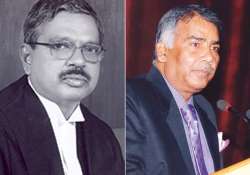Don't brand innocent people from minorities as terrorists, SC tells Gujarat Police
New Delhi, Sep 27 : The Supreme Court on Wednesday directed the Gujarat Police not to brand innocent persons belonging to minority community as terrorist and put them behind bars simply because they belong to

New Delhi, Sep 27 : The Supreme Court on Wednesday directed the Gujarat Police not to brand innocent persons belonging to minority community as terrorist and put them behind bars simply because they belong to a minority community.
A bench of Justices H l Dattu and C K Prasad while admonishing the Gujarat police ordered the acquittal of 11 persons arrested under TADA (Terrorist and Disruptive Activities (Prevention) Act) and other laws, who had been convicted earlier for allegedly planning to carry out communical violence during the Jagannath Yatra in Ahmedabad in 1994.
Police must ensure that no innocent person has the feeling of sufferance only because “my name is Khan, but I am not a terrorist,” the judges observed.
“We emphasise and deem it necessary to repeat that the gravity of the evil to the community from terrorism can never furnish an adequate reason for invading personal liberty, except in accordance with the procedure established by the Constitution and the law,” the Bench said.
Being an anti-terrorist law, the TADA's provisions could not be liberally construed, the Bench said.
“The District Superintendent of Police and the Inspector-General and all others entrusted with operating the law must not do anything which allows its misuse and abuse and [must] ensure that no innocent person has the feeling of sufferance only because ‘My name is Khan, but I am not a terrorist'.”
Justice Prasad said: “We appreciate the anxiety of the police officers entrusted with preventing terrorism and the difficulty faced by them.
Terrorism is a crime far serious in nature, graver in impact and highly dangerous in consequence. It can put the nation in shock, create fear and panic and disrupt communal peace and harmony. This task becomes more difficult when it is done by organised groups with outside support.”
But in the country of the Mahatma, the “means are more important than the end. Invoking the TADA without following the safeguards, resulting in acquittal, gives an opportunity to many and also to the enemies of the country to propagate that it has been misused and abused.”
In this case, Ashraf Khan and 10 others, who were convicted under the TADA, the Arms Act and the IPC were aggrieved that no prior approval of the SP, as mandated under the provisions, was obtained before their arrest and recording of statements.
A bench of Justices H l Dattu and C K Prasad while admonishing the Gujarat police ordered the acquittal of 11 persons arrested under TADA (Terrorist and Disruptive Activities (Prevention) Act) and other laws, who had been convicted earlier for allegedly planning to carry out communical violence during the Jagannath Yatra in Ahmedabad in 1994.
Police must ensure that no innocent person has the feeling of sufferance only because “my name is Khan, but I am not a terrorist,” the judges observed.
“We emphasise and deem it necessary to repeat that the gravity of the evil to the community from terrorism can never furnish an adequate reason for invading personal liberty, except in accordance with the procedure established by the Constitution and the law,” the Bench said.
Being an anti-terrorist law, the TADA's provisions could not be liberally construed, the Bench said.
“The District Superintendent of Police and the Inspector-General and all others entrusted with operating the law must not do anything which allows its misuse and abuse and [must] ensure that no innocent person has the feeling of sufferance only because ‘My name is Khan, but I am not a terrorist'.”
Justice Prasad said: “We appreciate the anxiety of the police officers entrusted with preventing terrorism and the difficulty faced by them.
Terrorism is a crime far serious in nature, graver in impact and highly dangerous in consequence. It can put the nation in shock, create fear and panic and disrupt communal peace and harmony. This task becomes more difficult when it is done by organised groups with outside support.”
But in the country of the Mahatma, the “means are more important than the end. Invoking the TADA without following the safeguards, resulting in acquittal, gives an opportunity to many and also to the enemies of the country to propagate that it has been misused and abused.”
In this case, Ashraf Khan and 10 others, who were convicted under the TADA, the Arms Act and the IPC were aggrieved that no prior approval of the SP, as mandated under the provisions, was obtained before their arrest and recording of statements.